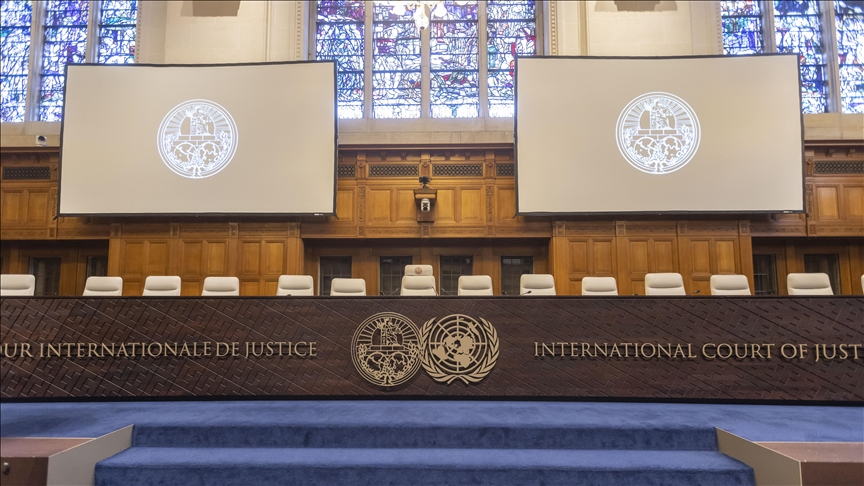Turkish Deputy Foreign Minister Ahmet Yildiz to make oral statement at International Court of Justice on Monday
Merve Berker | 25.02.2024

ANKARA
Türkiye’s Deputy Foreign Minister Ahmet Yildiz will make on Monday an oral statement at the International Court of Justice (ICJ) during a hearing on the legal consequences of Israeli actions in occupied Palestinian land.
The public hearings started last Monday in The Hague following the UN General Assembly's request for an advisory opinion on the legal consequences arising from policies and the practices of Israel in the Occupied Palestinian Territory, including East Jerusalem.
More than 50 countries are presenting arguments.
“At the end of this process, legal findings regarding the oppression of Palestinians will be presented,” Oncu Keceli, the Turkish Foreign Ministry spokesperson, said on X.
The ICJ had announced the calendar of oral presentations in the advisory opinion to be given on the legal consequences of Israel's acts in the Palestinian territories it has occupied, including East Jerusalem.
Accordingly, 52 states, including Türkiye, as well as the Arab League, the Organization of Islamic Cooperation, and the African Union, have begun to make 30-minute oral presentations on Feb. 19, starting with Palestine on the very first day, and will continue to do so until Feb. 26, which will be concluded with the Maldives on the afternoon.
Advisory opinions not binding
The main duties of the ICJ include resolving legal disputes that arise between states in line with international law and providing advisory opinions on legal issues referred to it.
The UN court, at the request of the UN General Assembly, will issue a non-binding advisory opinion on the legal consequences of Israel's policies and acts in occupied Palestine on this issue.
The public hearings of the court at the Hague Peace Palace are broadcast live.
This is the first time such a large number of states made written and oral statements to an advisory opinion before the court, while Israel, which made written statements, did not take part in the oral hearings.
The ICJ’s advisory opinion is not related to a disputed case between two states, unlike the case filed by South Africa at the International Criminal Court (ICC) against Israel for violation of the Genocide Convention, but only Israel.
It contains the world court’s non-binding legal opinion on the legal liability of Israel's occupation of Palestine.
World court opinion
In its resolution dated Dec. 30, 2022, the Special Political and Decolonization Committee of the UN General Assembly asked: "What are the legal consequences arising from Israel's continuous violation of the Palestinian people's right to self-determination, its prolonged occupation, settlement and annexation of the Palestinian territories it has occupied since 1967, including measures to change the demographic structure, character and status of Jerusalem, and its adoption of relevant discriminatory legislation and measures?"
The second question that the ICJ was asked to provide an advisory opinion on was: "How do the above-mentioned Israeli policies and actions affect the legal status of the occupation and what are the legal consequences of this status for all states and the UN?"
Countries and international institutions, including Türkiye, submitted written statements to the court giving their views on the questions on which advisory opinions would be given.
Headquartered in The Hague, the administrative capital of the Netherlands, the ICJ hears contentious cases between multiple states, as well as gives non-binding advisory opinions on questions posed by UN bodies and other special institutions.
In an advisory opinion in 2004, the court said the wall built by Israel on the occupied territories of Palestine violates international law.
Genocide case
South Africa brought a genocide case against Israel to the ICJ in late December and asked it to grant emergency measures to end the bloodshed in Gaza, where more than 29,600 Palestinians have been killed since Oct. 7.
The court also ordered Israel to take "immediate and effective" measures to enable the provision of urgently needed basic services and humanitarian assistance in the Gaza Strip but fell short of ordering a cease-fire.
The UN court on Jan. 26 found South Africa's claim that Israel is committing genocide plausible. The court issued an interim order urging Israel to stop obstructing aid deliveries into Gaza and to improve the humanitarian situation.
The statement said an international team was formed to follow Israeli crimes committed in Gaza.
Despite the International Court of Justice’s provisional ruling, Israel continues its onslaught on the Gaza Strip, where at least 29,600 Palestinians have been killed, mostly women and children, and 69,737 injured since Oct. 7, according to Palestinian health authorities.
Less than 1,200 Israelis are believed to have been killed in the Hamas attack.
The Israeli war on Gaza has pushed 85% of the territory's population into internal displacement amid acute shortages of food, clean water and medicine, while 60% of the enclave's infrastructure has been damaged or destroyed, according to the UN.
No comments:
Post a Comment